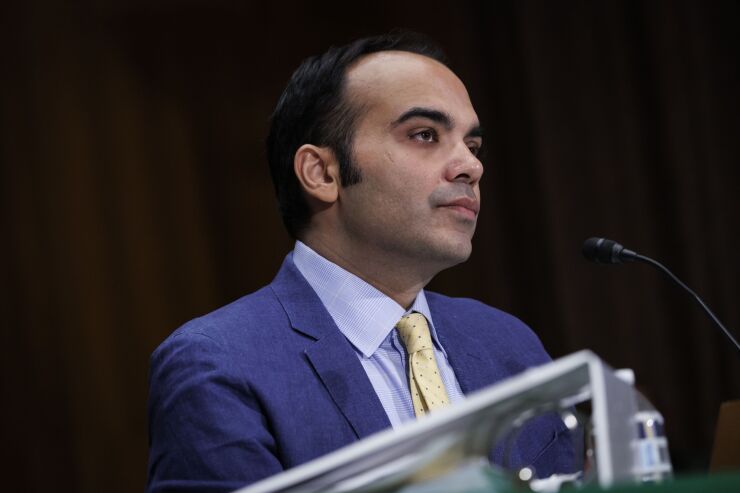The Consumer Financial Protection Bureau plans to cut credit card late fees to $8, wiping out up to $9 billion a year in fees that have become highly profitable for banks and credit card companies.
CFPB Director Rohit Chopra plans to propose a rule on Wednesday that would slash late fees from the current $30 for the first fee and $41 for each subsequent missed payment, a potential fivefold drop. The proposal would set credit card late fees at reasonable levels and no longer allow late fees to be pegged annually to inflation.
The CFPB's proposal would address a loophole created by the Federal Reserve Board in 2010 that allowed issuers to raise credit card late fees every year. The announcement
"Over a decade ago, Congress banned excessive credit card late fees but companies have exploited a regulatory loophole that has allowed them to escape scrutiny for charging an otherwise illegal junk fee," Chopra said in a press release. "Today's proposed rule seeks to save families billions of dollars and ensure the credit card market is fair and competitive."

The change comes as credit card debt has skyrocketed to nearly $1 trillion and amid growing fears that the economy could dip into a recession. The proposed rule would still allow credit card companies to charge late fees. But such fees would essentially be capped at $8 for any missed payment. If an issuer wanted to charge higher late fee, they would have to show why the higher fee is justified.
Chopra is expected to announce the plan alongside President Biden at a meeting of the President's Competition Council. The change is part of a broad governmentwide effort by the White House to show that it is helping reduce costs for average Americans. A year ago, Chopra
"Our goal is to ensure that the credit card market is fair and competitive," Chopra said. "Junk fees have unfortunately become the norm."
Under the proposal, the CFPB would amend the Credit Card Accountability Responsibility and Disclosure Act of 2009. The CARD Act mandates that late fees be "reasonable and proportional" to the costs incurred to deal with late payments. Of the 20 largest card issuers, 18 of them charge late fees at or near the maximum level allowed by the CARD Act, the CFPB found in a report last year. Late fees also can add to the interest charged on a consumer's overdue balance.
"The guardrails of today are not what Congress intended when it passed the Card Act," Chopra said.
A proposal by the Consumer Financial Protection Bureau to rein in credit card late fees could result in changes to a "safe harbor" that would favor consumers rather than financial institutions.
Technically, the proposed rule would lower the so-called immunity provision for late fees. It would also ban late fee amounts that are above 25% of the consumer's minimum payment. Consumer advocates have been pushing for the changes.
Last year, the CFPB laid the groundwork for the current plan by first launching a broad review of junk fees and then issuing an advance notice of proposed rulemaking. The plan will be open for public comment for 60 days after it is published in the Federal Register. Most formal rulemakings take at least a year.
In addition to the CFPB's proposed rule on late fees, the Department of Transportation is proposing a rule to require airlines and online booking services to show the full price of a plane ticket up front, including baggage and other fees. And the Department of Commerce's National Telecommunications and Information Administration also released a report Wednesday that found two technology giants — Apple and Google —are impeding competition and inflating prices by controlling mobile apps stores that restrict consumer choice. The Biden administration is calling on Congress to propose legislation to overhaul the mobile app ecosystem.
"Many Americans believe these fees are just plain wrong," Chopra said. "When it comes to excessive credit card late fees that are costing Americans billions of dollars each year, we had to act."






